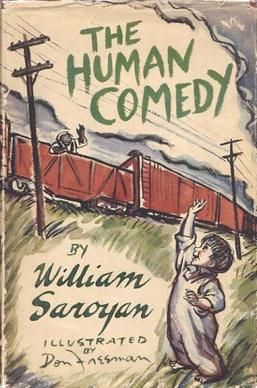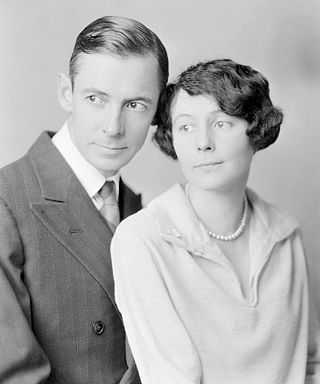
The Human Comedy is a 1943 novel by William Saroyan. It originated as a 240-page film script written for MGM. Saroyan was planning to produce and direct the film, but he was dropped from the project either because the script was too long or because a short film he directed as a test was not considered acceptable — or both. He walked off the lot, went home, and swiftly created a novelization, which was published just before the film came out. It was the March 1943 Book-of-the-Month Club selection, and became a best-seller a week after its release. Saroyan won the Academy Award for Best Story for the film, The Human Comedy.

Porgy and Bess is an English-language opera by American composer George Gershwin, with a libretto written by author DuBose Heyward and lyricist Ira Gershwin. It was adapted from Dorothy Heyward and DuBose Heyward's play Porgy, itself an adaptation of DuBose Heyward's 1925 novel of the same name.

Anne Brown was an American soprano for whom George Gershwin rewrote the part of "Bess" into a leading role in the original production of his opera Porgy and Bess in 1935.

Robert Todd Duncan was an American baritone opera singer and actor. One of the first African-Americans to sing with a major opera company, Duncan is also noted for appearing as Porgy in the premier production of Porgy and Bess (1935).

Edwin DuBose Heyward was an American author best known for his 1925 novel Porgy. He and his wife Dorothy, a playwright, adapted it as a 1927 play of the same name. The couple worked with composer George Gershwin to adapt the work as the 1935 opera Porgy and Bess. It was later adapted as a 1959 film of the same name.
Arthur Terence Galt MacDermot was a Canadian-American composer, pianist and writer of musical theater. He won a Grammy Award for the song "African Waltz" in 1960. His most-successful musicals were Hair and Two Gentlemen of Verona (1971). MacDermot also composed music for film soundtracks, jazz and funk albums, and classical music, and his music has been sampled in hit hip-hop songs and albums. He is best known for his work on Hair, which produced three number-one singles in 1969: "Aquarius/Let the Sunshine In", "Good Morning Starshine", and the title song "Hair".

Blue Monday was the original name of a one-act "jazz opera" by George Gershwin, renamed 135th Street during a later production. The English libretto was written by Buddy DeSylva. Though a short piece, with a running time of between twenty and thirty minutes, Blue Monday is often considered the blueprint to many of Gershwin's later works, and is often considered to be the "first piece of symphonic jazz" in that it was the first significant attempt to fuse forms of classical music such as opera with American popular music, with the opera largely influenced by Jazz and the African-American culture of Harlem.

Dorothy Heyward was an American playwright.
Porgy and Bess, the opera by George Gershwin, has been recorded by a variety of artists since it was completed in 1935, including renditions by jazz instrumentalists and vocalists, in addition to operatic treatments.

Porgy and Bess is a 1959 American musical drama film directed by Otto Preminger, and starring Sidney Poitier and Dorothy Dandridge in the titular roles. It is based on the 1935 opera Porgy and Bess by George Gershwin, DuBose Heyward and Ira Gershwin, in turn based on Heyward's 1925 novel Porgy, as well as Heyward's subsequent 1927 non-musical stage adaptation, co-written with his wife Dorothy. The film's screenplay, which turned the operatic recitatives into spoken dialogue, was very closely based on the opera and was written by N. Richard Nash.

The Golden Apple is a musical adaptation of parts of the Iliad and Odyssey with music by Jerome Moross and lyrics by John Treville Latouche. The musical premiered Off-Broadway in 1954 and then transferred to Broadway.
Bonnie Koloc is an American folk music singer-songwriter, actress and artist. She was considered one of the three main Illinois-based folk singers in the 1970s, along with Steve Goodman and John Prine forming the "trinity of the Chicago folk scene". Her music continues to be recognized and valued by historians of Chicago folk music as well as by her long standing fan base in that area. But her voice, which may be considered crystalline in its clarity, is remembered as well.
Hope Clarke is an American actress, dancer, vocalist, choreographer, and director. Clarke performed as principal dancer with the Katherine Dunham Company and the Alvin Ailey American Dance Theater, 1960s; actress on stage, film, and television, 1970s–1980s; choreographer and director, 1980s--. Clarke served on the Tony Awards Nominating Committee for the 2011–12 Broadway season. Clarke made history in 1995 when she became the first African American, as well as the first African-American woman, to direct and choreograph a major staging of the opera-musical Porgy and Bess. Clarke's production of the George Gershwin classic was staged in celebration of the work's 60h anniversary, and it toured not only major American cities but Japan and Europe as well. Clarke drew critical acclaim for her commitment to staging the show as a monument to African-American community and pride, giving a more hopeful, positive aura to a story that has been criticized for its stereotypes. As for the director herself, the success of Porgy and Bess is just the latest accolade in a long career devoted to dance and drama.
Tazewell Thompson, is an African-American theatre director, the former artistic director of the Westport Country Playhouse (2006–07) in Westport, Connecticut and the Syracuse Stage (1992–95) in New York state. Prior to that he was an assistant director at Arena Stage in Washington, D.C. He is the Director of Opera Studies at Manhattan School of Music.
"I Loves You, Porgy" is a duet from the 1935 opera Porgy and Bess with music by George Gershwin and lyrics by Ira Gershwin. It was performed in the opera's premiere in 1935 and on Broadway the same year by Anne Brown and Todd Duncan. They recorded the song on volume 2 of the album Selections from George Gershwin's Folk Opera Porgy and Bess in 1942. The duet occurs in act 2, scene 3, Catfish Row, where Porgy promises Bess that he will protect her. Bess has a lover, Crown, who is abusive and continually seduces her.
Bruce Hubbard was an American operatic baritone. A Drama Desk and Laurence Olivier Award nominee for Best Actor, he performed on Broadway, the Metropolitan Opera, BBC television, in concert and made several recordings. He is most famous for appearing as Joe in Show Boat, and as Jake, as well as Porgy, in Porgy and Bess on Broadway, the West End, and in several major opera houses and regional theatres. He graduated from the Indiana University Jacobs School of Music.
Diane Marie Paulus is an American theater and opera director who is currently the Terrie and Bradley Bloom Artistic Director of the American Repertory Theater at Harvard University. Paulus was nominated for the Tony Award for Best Direction of a Musical for her revivals of Hair and The Gershwins' Porgy and Bess, and won the award in 2013 for her revival of Pippin.

The Human Comedy is a 1943 American comedy-drama film directed by Clarence Brown. It began as a screenplay by William Saroyan, who was expected to direct. After Saroyan was removed from the project, he wrote the novel of the same name and published it just before the film was released. Howard Estabrook was brought in to reduce the run time to two hours. The picture stars Mickey Rooney with Frank Morgan; also appearing in the film are James Craig, Marsha Hunt, Fay Bainter, Ray Collins, Van Johnson, Donna Reed and Jackie "Butch" Jenkins. Barry Nelson, Robert Mitchum and Don DeFore appear together as boisterous soldiers in uncredited supporting roles.

Porgy: A Play in Four Acts is a play by Dorothy Heyward and DuBose Heyward, adapted from the short novel by DuBose Heyward. It was first produced by the Theatre Guild and presented October 10, 1927 – August 1928 at the Guild Theatre in New York City. Featuring a cast of African Americans at the insistence of its authors—a decision unusual for its time—the original production starred Frank Wilson, Evelyn Ellis, Jack Carter, and Rose McClendon. Porgy marked the Broadway directing debut of Rouben Mamoulian. The play ran a total of 55 weeks in New York, and the original cast toured the United States twice and performed for 11 consecutive weeks in London.

Ithaca is a 2015 American drama film directed by Meg Ryan and written by Erik Jendresen. It is based on the 1943 novel The Human Comedy by William Saroyan. The film stars Alex Neustaedter, Jack Quaid, Meg Ryan, Sam Shepard, Hamish Linklater and Tom Hanks. The film was released on September 9, 2016, by Momentum Pictures.











